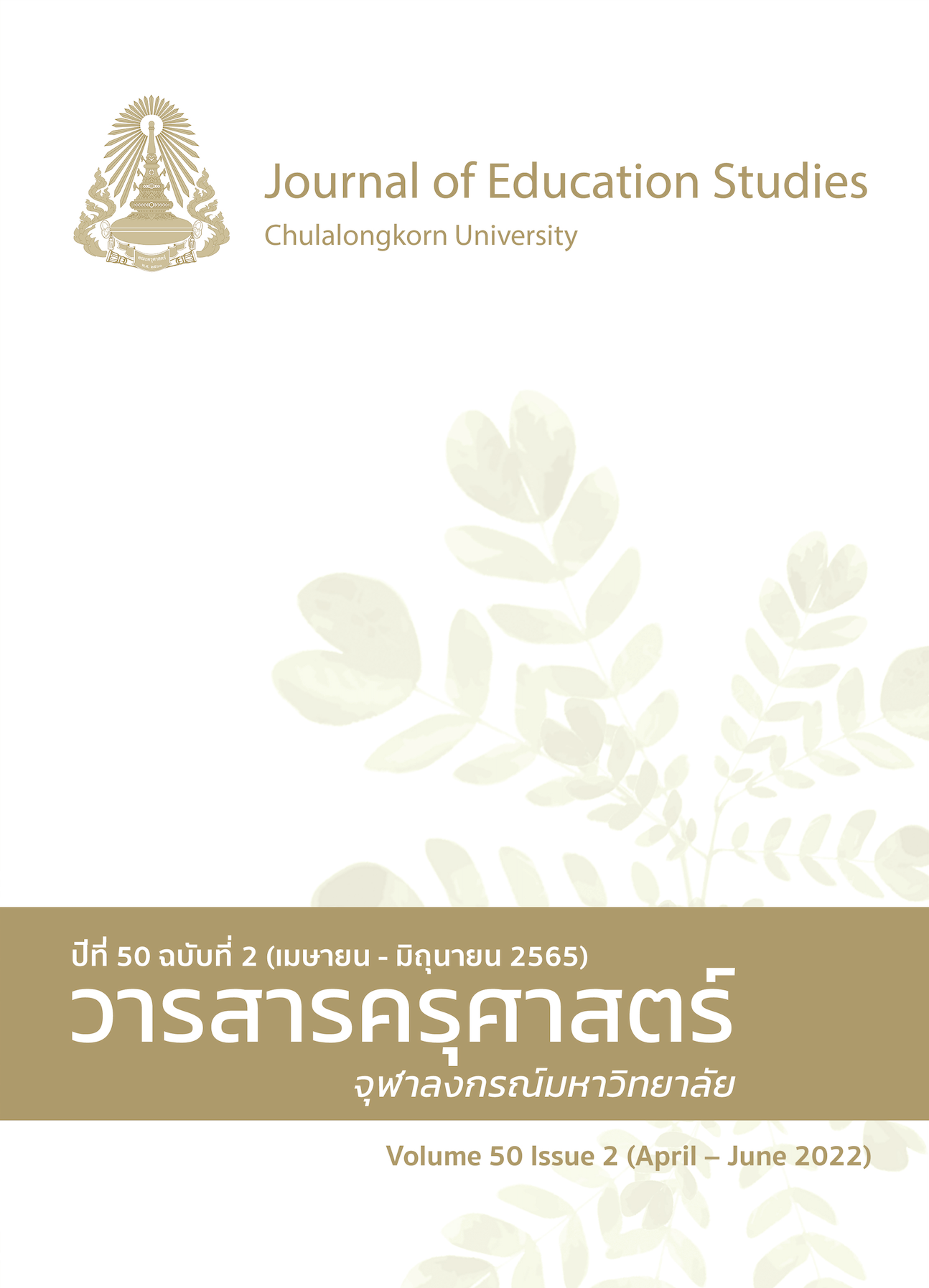ผลของโปรแกรมการส่งเสริมพฤติกรรมการรับประทานอาหารสำหรับเด็กอนุบาลในเขตดุสิต กรุงเทพมหานคร
DOI:
https://doi.org/10.14456/educu.2022.16คำสำคัญ:
เด็กอนุบาล, โปรแกรมส่งเสริมพฤติกรรมการรับประทานอาหาร, แนวคิด Precede Frameworkบทคัดย่อ
การวิจัยนี้มีวัตถุประสงค์เพื่อศึกษาผลของการใช้โปรแกรมการส่งเสริมพฤติกรรมการรับประทานอาหารสำหรับเด็กอนุบาลในเขตดุสิต กรุงเทพมหานคร พัฒนาขึ้นตามกรอบแนวคิด Precede Framework ประกอบด้วย กิจกรรม 3 ระยะ ได้แก่ ระยะที่ 1 เสริมสร้างความรู้ ระยะที่ 2 ปรับสภาพแวดล้อมสร้างทัศนคติ ระยะที่ 3 ส่งเสริมพฤติกรรมการรับประทาน ตัวอย่าง คือ ผู้ปกครอง จำนวน 32 คน และเด็กอนุบาล อายุ 5-6 ปี จำนวน 32 คน ในโรงเรียนสังกัดกรุงเทพมหานคร เขตดุสิต จากการเลือกแบบเจาะจง โดยเลือกเด็กที่มีภาวะโภชนาการขาด หรือ ภาวะโภชนาการเกินตามกราฟแสดงเกณฑ์อ้างอิงการเจริญเติบโต ไม่มีปัญหาด้านการสื่อสาร ไม่เป็นโรคที่แพทย์ให้จำกัดอาหารบางประเภท และมีผู้ปกครองเป็นผู้ดูแลด้านอาหาร เครื่องมือที่ใช้คือ แบบทดสอบความรู้เรื่องโภชนาการสำหรับเด็กอนุบาลของผู้ปกครอง และแบบบันทึกพฤติกรรมการรับประทานอาหารของเด็กอนุบาล วิเคราะห์ข้อมูลด้วยการหาค่าเฉลี่ย ค่าส่วนเบี่ยงเบนมาตรฐาน และใช้สถิติ t-test ผลการวิจัย พบว่า หลังการใช้โปรแกรมฯ ค่าเฉลี่ยคะแนนความรู้เรื่องโภชนาการสำหรับเด็กอนุบาลของผู้ปกครองสูงกว่าก่อนเข้ารับการอบรม อย่างมีนัยสำคัญทางสถิติที่ระดับ.05 และค่าเฉลี่ยคะแนนพฤติกรรมการรับประทานอาหารของเด็กอนุบาลสูงกว่าก่อนการทดลอง อย่างมีนัยสำคัญทางสถิติที่ระดับ .05
สรุปได้ว่า ผู้ปกครองที่เข้าร่วมโปรแกรมการส่งเสริมพฤติกรรมการรับประทานอาหารสำหรับเด็กอนุบาล สามารถส่งเสริมเด็กอนุบาลให้มีพฤติกรรมการเลือกรับประทานอาหารที่ดีมีประโยชน์มากขึ้น
เอกสารอ้างอิง
ภาษาไทย
จาฏุพัจน์ มงคลวัจน์. (2557). บทบาทของผู้ปกครองในการส่งเสริมทักษะชีวิตของเด็กวัยอนุบาล. วารสาร
อิเล็กทรอนิกส์ทางการศึกษา, 9(1), 563 - 574.
ฟริดาวส์ หะยีตาเฮ, กมลวรรณ วณิชชานนท์, อุไรวรรณ ศิริธรรมพันธ์, ฟาริห์ มะหมัด, เลิศลักษณ์ เรืองทอง, และ รอซีกีน สาเร๊ะ. (2561, 12 กุมภาพันธ์). ปัจจัยที่มีความสัมพันธ์กับภาวะโภชนาการของเด็กอายุ 0-5 ปี ในเขตความรับผิดชอบของศูนย์สุขภาพชุมชนเมืองบ้านสะเตง ตำบลสะเตง อำเภอเมือง จังหวัดยะลา
[Paper presentation]. การประชุมวิชาการระดับชาติด้านวิทยาศาสตร์และเทคโนโลยีเครือข่ายภาคใต้ ครั้งที่ 3 ประจำปี 2561, ห้องประชุมเซอรา อาคาร 24 มหาวิทยาลัยราชภัฏยะลา.
มณีรัตน์ วงค์หงส์. (2554). การมีส่วนร่วมในการจัดการศึกษาปฐมวัยของโรงเรียนอนุบาลระยอง สำนักงานเขตพื้นที่การศึกษา
ประถมศึกษาระยอง เขต 1 [วิทยานิพนธ์ปริญญามหาบัณฑิต, มหาวิทยาลัยบูรพา]. Burapha University Library.
https://webopac.lib.buu.ac.th/Catalog/BibItem.aspx?BibID=b00221992
รัชนก ใจเชิดชู, นงเยาว์ อุดมวงศ์ และวราภรณ์ บุญเชียง. (2556). การพัฒนาโปรแกรมการส่งเสริมสุขภาพโดยการมีส่วนร่วม
ของชุมชนสำหรับนักเรียนที่มีภาวะน้ำหนักเกิน. วารสารพยาบาลสาร, 40(2), 64-76.
วนิสา องอาจ และ สิริมา ภิญโญอนันตพงษ์. (2559). การศึกษาพฤติกรรมการบริโภคอาหารของเด็กปฐมวัยโรงเรียนสังกัด
กรุงเทพมหานคร. วารสารวิชาการศึกษาศาสตร์, 17(2), 13-27.
วรวรรณ จงสง่าวิทยาเลิศ. (2558, 5 มกราคม). ปัญหาการกินในเด็ก. สถาบันราชานุกูล. http://rajanukul.go.th/iqeq/
index.php?mode=iqeq&group_id=0&id=171
ศักรินทร์ สุวรรณเวหา, อมาวสี อัมพันศิริรัตน์, และ วิภารัตน์ สุวรรณไวพัฒนะ. (2562). ปัจจัยที่มีความสัมพันธ์กับภาวะ
โภชนาการของเด็กวัยก่อนเรียน: การทบทวนวรรณกรรมอย่างเป็นระบบ. วารสารวิทยาลัยพยาบาลบรมราชชนนี
นครราชสีมา, 25(2), 8-24.
สโรชา นันทพงศ์, นฤมล ศราธพันธุ์, และอภิญญา หิรัญวงษ์. (2557). ความรู้เกี่ยวกับโภชนาการและพฤติกรรมการจัดอาหาร
สำหรับเด็กวัยก่อนเรียนของผู้ปกครองโรงเรียนรัฐบาล จังหวัดชุมพร. วารสารวิทยาสารเกษตรศาสตร์ สาขา
สังคมศาสตร์, 35(2), 235-244.
สำนักงานสถิติแห่งชาติ. (2561). การสำรวจพฤติกรรมการบริโภคอาหารของประชากร พ.ศ. 2560. สำนักงานสถิติแห่งชาติ.
http://www.nso.go.th/sites/2014/DocLib13/ด้านสังคม/สาขาสุขภาพFood_consumption_behavior_
of_the_population/2560/รายงานฉบับสมบูรณ์.pdf
สำนักงานสถิติแห่งชาติ. (2563). รายงานผลฉบับสมบูรณ์ การสำรวจสถานการณ์เด็กและสตรีในประเทศไทย พ.ศ.2562.
สำนักงานสถิติแห่งชาติ. https://www.unicef.org/thailand/media/5151/file/การสำรวจสถานการณ์เด็กและ
สตรีในประเทศไทย%202562%20-%20รายงานผลฉบับสมบูรณ์.pdf
อติพร สำราญบัว และ เบญจมาศ ทำเจริญตระกูล. (2560). พฤติกรรมสุขภาพทางเลือกที่ช่วยลดความดันโลหิตสูง. วารสาร
วิทยาลัยพยาบาลบรมราชชนนี นครราชสีมา, 23(2), 121-132.
อิสรียา พรหมมา และ ชัยนันท์ เหมือนเพ็ชร. (2557). ปัจจัยที่มีผลต่อพฤติกรรมการบริโภคอาหารตามสุขบัญญัติแห่งชาติของ
นักเรียนโรงเรียนวัดศิริจันทราราม จังหวัดปทุมธานี. ใน สุทธิพันธ์ จิตพิมลมาศ (ประธาน), Rethink: Social
Development for Sustainability in ASEAN Community [Symposium]. การประชุมวิชาการการพัฒนา
ชนบทที่ยั่งยืน ครั้งที่ 4 ประจำปี 2557, เซ็นทารา โฮเต็ล แอนด์ คอนเวนชันเซ็นเตอร์ จังหวัดขอนแก่น
ภาษาอังกฤษ
Bruner, J. (1966). Toward a theory of instruction. Harward University Press.
Dewey, J. (1969). Philosophy Education, and Reflective Thinking. In T. O. Buford (Ed.), Toward a philosophy
of education. Macmillan.
Kriengsinyos, W. (2014). Eat the fruit and vegetables. 400 g per day to better health, The documentation
for academic meeting National Food and Nutrition for health 1#. Mahidol University. (In Thai)
New Zealand Ministry of Health. (2012). Food and nutrition guidelines for healthy children and young
people (aged 2-18 years). Ministry of Health.
Piaget, J. (1963). The origins of intelligence in children. W.W. Norton & Company.
ดาวน์โหลด
เผยแพร่แล้ว
รูปแบบการอ้างอิง
ฉบับ
ประเภทบทความ
สัญญาอนุญาต

อนุญาตภายใต้เงื่อนไข Creative Commons Attribution-NonCommercial-NoDerivatives 4.0 International License.




